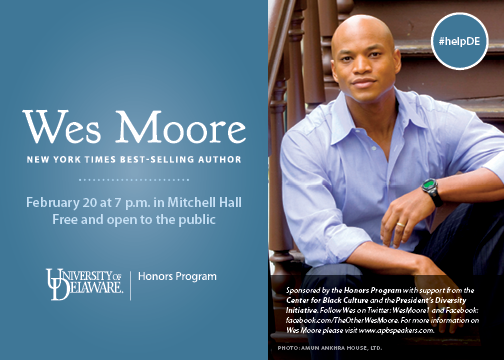by Joshua Sarnecky and Brie Gerry
As much as I love reading, biographies and other forms of non-fiction usually aren’t the books on the top of my wish list; I’d much rather pick up something from Stephen King or Tolkien. Reading The Other Wes Moore, then, took me a bit out of my literary comfort zone. Having read plenty of other summer reading biographies (most of them mandatory), I thought I knew what to expect going into this book: a lot of summary and passive description instead of drama and active depiction. With those expectations in mind, I was surprised by the detailed situations and complex characters in Moore’s book.
Ironically, most of the non-fiction texts I’ve read don’t have these elements, which has always perplexed me since real life and real people experience tremendous levels of drama, tragedy, comedy, and triumph every day. Seeing these incongruities, I’ve always felt that fictional accounts did a better job of capturing these aspects of the human experience. But The Other Wes Moore manages to give more than just an overview of both Wes Moores’ lives; the story truly does get to the heart of each man’s experience, providing a magnifying glass through which readers can observe each man’s journey and the realities of city life, poverty, teenage pregnancy, the drug trade, and delinquency. Wes Moore succeeds in bringing his book’s tagline to life, revealing the tragedy and chilling truth that the protagonists’ lives could have been switched.
The book’s depiction of life in the darker corners of Baltimore and the Bronx, however, moved me more as a Psychology major than a reader. When thinking of Baltimore, many people would imagine the Inner Harbor, the aquarium, and the city’s championship football team, but Moore’s book presents a very different side of the city. And Baltimore isn’t the only city with more than one face; every city in America (if not the world) experiences an unfortunate dichotomy of affluence and poverty.
As Wes Moore mentions in his Afterword, though, this cause for concern is likewise a call for action. If a lack of strong positive mentors was the deciding difference between the protagonists, as Wes Moore the author suggests, then we as readers can figure out what needs to be done. If we want to answer these issues, we must get behind those politicians who support educational and social programs that keep kids in school and adults at work. We must support organizations that help the country’s impoverished and underprivileged youth. We must realize that we have a responsibility to aid our community. We must be the role models that both Wes Moores so desperately needed but only one found.
The Other Wes Moore wasn’t the book I expected, but I don’t expect that to change my preference for fiction over non-fiction. What I do expect, though, is for readers to look at the problems of inner-city life with more awareness and understanding. And I hope that no one reading this book expects these issues to solve themselves. If we expect change, we first have to change the expectations we have for ourselves and our roles in society.
I don’t think I can remember the last time I read a book for fun (and more specifically, one that wasn’t a textbook). However, I finally broke my streak, which has probably been ongoing since at least last spring break.
When I picked up The Other Wes Moore, the idea of this-is-a-story-about-two-people-with-the-same-name sparked my interest, primarily because I’m fairly certain I’ll never meet anyone with my name. I was expecting a dramatic narrative detailing how two men ended up in radically different places, and as a science-minded person, it appeared to be a classic nature-versus-nurture scenario. But once I started reading, I was shocked at the role that seemingly unimportant nuances in each Wes’s environment – considering that they grew up within blocks of one another – played in the paths each would follow.
Of course I’ve read books and stories that have been thought-provoking about a couple topics or a central theme, but The Other Wes Moore got my mind rolling with questions on a vast array of subjects. I’ve re-written this blog at least four (or was it three?) different times because I couldn’t settle on a topic. Why? Because the book is so complex beyond the simple story-telling.
With the author Wes Moore as a highly accomplished Rhodes Scholar and White House Fellow and the other Wes Moore being a convicted murderer currently serving a life sentence, the nature-versus-nurture debate is only one of many different themes the story touches upon. How does poverty interplay with education? How do federal budget cuts on education affect the individual? The mother of the convict Wes might have had the chance to move to a better place had she been able to complete her education. Meanwhile, how does urban drug culture shape the lives of young adults, teenagers, and children? As a review on the book’s back cover points out, another excellent point of Mr. Moore’s story is “how it feels to be a boy growing up in a world where violence makes you a man.”
So why should you engage in some positive procrastination and read this book? First, it’s a quick read, so you’ll quickly get back to that problem set, essay, or reading you’re supposed to be doing. Second, there are pictures (and who doesn’t like pictures in books!). And third, I bet you’ll catch yourself wondering when exactly one Wes’s life diverges from the other or wonder about all the decisions and moments that have led you to where you are now, even to reading this blog.
Don’t like reading but I’ve got you interested anyways? Come see Wes Moore speak on campus February 20th! Did I mention he also served a tour of combat duty in Afghanistan? And now he’s a bestselling author, too. At 34 years old, Mr. Moore has accomplished more than most people accomplish in a lifetime, and I’m excited to hear him speak.
Lesson learned: I should read books a little more often.












